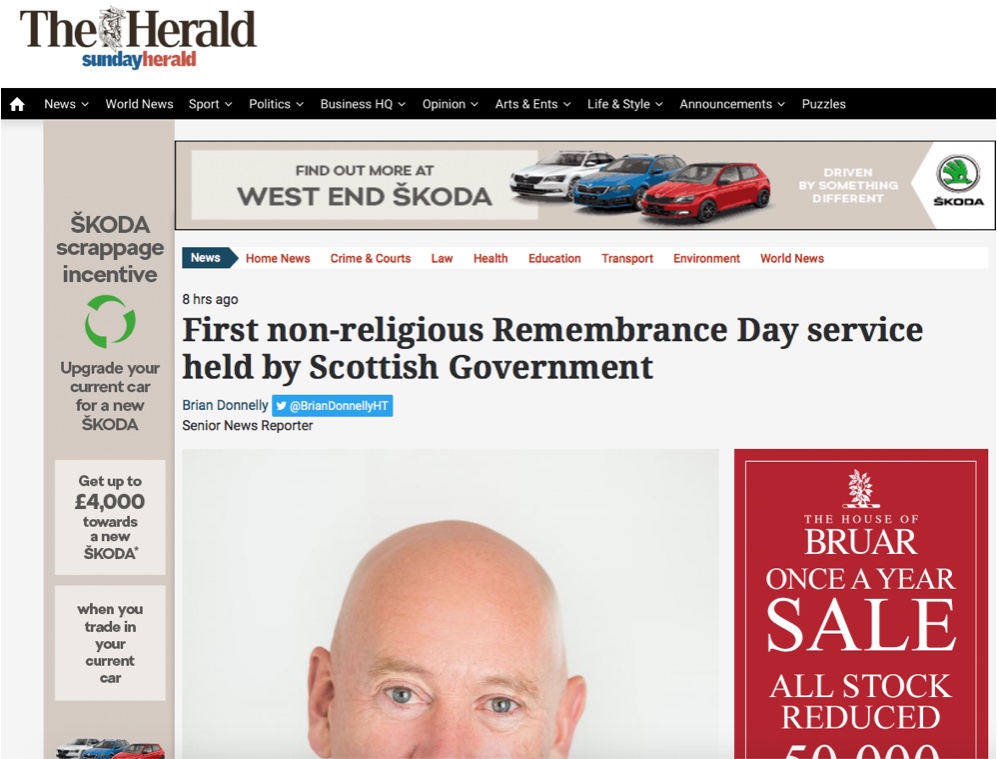I was honoured to be asked to deliver a Remembrance address to the staff of the Scottish Government at St. Andrew’s House in Edinburgh yesterday.
As no humanist has ever been invited to be part of an official event of this kind, it meant a lot, and it seemed very fitting that it happened 99 years after the Armistice was signed, at the eleventh hour, of the eleventh day. This is the speech I gave.
Good morning, everyone, and thank you, Permanent Secretary, for asking me to be a part of this ceremony. My name’s Tim Maguire. I’m a humanist celebrant and the honorary humanist chaplain to the University of Edinburgh. I’m very conscious that even though it’s almost 100 years since the Armistice was declared, this is the first time that a humanist has ever been invited to speak at an official remembrance event anywhere in the UK, so it’s an honour to be here.
In case you haven’t come across the word before, I should probably say that Humanism is a very old philosophy which can be summed up quite quickly. Humanists believe we should behave towards others as we would like them to behave towards us: we believe we can lead good and worthwhile lives, guided only by compassion and reason, and we believe, as the late Jo Cox MP said, that “We are far more united, and have far more in common with each other than things that divide us”.
Contrary to popular belief, there have always been atheists in foxholes, and Humanists have long campaigned for more inclusive remembrance ceremonies, because we recognise the sacrifices which have been made, and which continue to be made by non-religious members of the Armed Forces. There is actually an organisation called the Defence Humanists, who I know are heartened that I am here, and I am grateful to their chair, Squadron Leader Emily McCullouch, for helping me form my thoughts today.
It’s 99 years since the end of ‘the war to end all wars’. In it, national armies of conscripted men were formed up in parallel lines to kill one other from a range of as little as 50 yards, very much as battles had been fought for the previous five hundred years. The morality was black and white, and most of the casualties were military, so it can be argued that the First World War was ‘a just war’, however awful it was for the participants. And awful it undoubtedly was, as the poetry of the war reminds us.
One of the most powerful war poems was written not far from here, at Craiglockhart Hospital. Its author, Wilfred Owen, had been severely traumatised by his time in the trenches, and the poem describes a man as he succumbs to a gas attack, ‘guttering, choking, drowning’. It ends with these lines:
My friend, you would not tell with such high zest
To children ardent for some desperate glory,
The old Lie: Dulce et decorum est
Pro patria mori.
Wilfred Owen returned to the front line following his spell in Craiglockhart, and he was killed on 4th of November 1918, just a week before the Armistice was declared. Despite that, Dulce et Decorum Est is not a poem we generally hear on Armistice Day. Instead, we get the Ode to Remembrance, which comes from a longer poem called ‘For the Fallen’. It written at the very beginning of the war by Laurence Binyon, who unlike Wilfred Owen, wasn’t a soldier.
The words of the Ode to Remembrance are engraved on war memorials and cenotaphs throughout the English-speaking world, and they embody that particular mixture of respect, admiration and grief that remembrance ceremonies aim to express. They’re very beautiful words but they’re not true. We hear them every year, and then we forget.
It’s nearly a century since the First World War ended, but conflict continues. That is a cause for deep regret, but we should be glad of one thing at least: in that time, our national and cultural morality has changed. We the public now know more about war and its causes than we have ever have done, and we no longer countenance the bigotry that would have been unthinkingly acceptable to the generation that fought the First World War.
I hope we can also acknowledge that in a ceremony of remembrance, it’s no longer appropriate to remember only the sacrifices of white Christian men. We should instead think carefully about every individual who gave up their lives for us, and in that hope, I’d like to offer this poem.
To the nameless millions who lie in mass graves,
From Katyn to Cambodia,
Treblinka to Shatila:
We will remember you.
To the prisoners of conscience, caged for their beliefs,
The peace protestors, shot by their own side
The secretly imprisoned, and the illegally tortured:
We will remember you.
To the desperate refugees fleeing persecution,
Tutsi and Hutu,
Rohingya and Yazidi:
We will remember you
To the ones who didn’t choose to die for their country
To Jane Doe and Seamus McEnroe,
From the Twin Towers to the Twin Rivers,
We will remember you.
To the innocent bystanders, the collateral damage,
From the ghetto to Aleppo,
From Guernica to Raqqa,
We will remember you.
To the guests struck by drones on their way to the wedding,
The shoppers shot by snipers in the market square,
To the children killed by landmines as they played in the street:
We will remember you
To the lions led by donkeys,
Tommy Atkins, Jack Tar, and GI Joe.
To the unknown soldiers, sailors, air men and women,
Black, brown and white,
We will remember you.
From the flowers of the forest
To the fallen of Flanders field,
At the going down of the sun and in the morning,
We will remember you.
My thanks also go to Brian Donnelly of The Herald, who wrote about it in today’s edition of the paper.


0 Comments Leave a comment